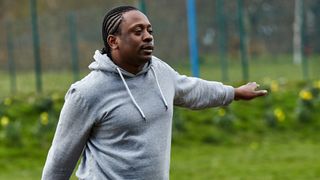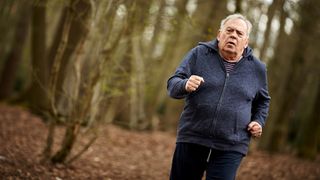How To Lose Weight Fast Without Going To Extremes
Expert advice on how to lose weight in a safe and sustainable way

If you feel like you need to lose weight, it’s only natural that you want to do so as quickly as possible. Losing weight is not easy, and getting started can be hard enough, so who wouldn’t want to skip to the bit when you begin to see results?
However, simply aiming to get as much weight off as quickly as possible is unlikely to be the best way to go about it.
“The faster somebody loses weight, the more dangerous and unstructured a programme is,” said Marvin Burton, who was head of fitness at Anytime Fitness when we first spoke to him. “Rapid weight changes are not sustainable and often there is something extreme taking place, such as not eating enough or overtraining.”
Maintaining a healthy weight is something that will benefit you throughout your life, so a sustainable plan is key. We asked Burton for some more tips on how to go about losing weight and how quickly you should expect to do it.
We also spoke to Michael Gleeson, emeritus professor of exercise biochemistry at Loughborough University’s School of Sport, Exercise and Health Sciences, who’s spent years trying to make scientific exercise and diet advice accessible to the average person with his books Eat, Move, Sleep, Repeat, The Pick ’n Mix Diet and Beating Type 2 Diabetes.
1. Don’t expect to lose a lot of weight every week
“There should be a balance of increasing muscle mass and decreasing bodyweight,” says Burton. “In fact, with structured weight loss programmes, some weeks there should be no change on the scales.
“A weekly decrease in body fat of around 0.2-0.5% would be very good. However, your starting weight should be considered. If you are 30-40kg overweight then you could expect larger drops initially, but these should slow down and become controlled otherwise there will also be a fast development of excess skin.”
Get the Coach Newsletter
Sign up for workout ideas, training advice, reviews of the latest gear and more.
2. Don’t just diet
“Dieting commonly results in a reduction in resting metabolic rate of 10 to 15%,” says Gleeson. “Essentially, your body adapts to the lower energy intake and you become more food-efficient. This makes weight loss more difficult because to keep up the same rate of weight loss that you achieved in the first couple of weeks of dieting you have to cut another 200-300 calories.
“While dieting alone can be an effective strategy for losing body weight, combining dieting and exercising is the best strategy for both reducing body weight and improving your health. This is backed up by numerous scientific studies that show that for a given daily calorie deficit, people will lose more body weight by combining dieting and exercise than by dieting alone. Not only is more weight lost, but virtually all of it is achieved by a reduction in body fat. With dieting alone, some muscle mass is usually also lost, which also contributes to a further reduction in resting metabolic rate.”
3. Don’t start with HIIT
“This is a common and dangerous mistake to make,” says Burton. “High-intensity exercise in the form of jumping or rapid movements shouldn’t even be considered if you are new to exercise. Your muscles, joints and nutrition will struggle to cope right away. You will be increasing your chances of injury with high-impact movements, and you also risk overwhelming your central nervous system prematurely.
“For a beginner, fast walking is a good place to start because it is relatively high-intensity and poses less risk. My suggested training method would be resistance training because it burns body fat for longer periods of time, as well as being low-impact and controllable.”

4. Start with resistance training
“Resistance training is the best form of exercise to burn body fat,” says Burton. “It gives you the fastest and longest-lasting benefits for the time spent. I would suggest starting with larger muscle groups and work on improving your posture and muscles that are commonly weak.
“When these muscles are conditioned first, you will immediately have a better structural balance to your body, decreasing your chance of injury. I would expect it to improve your self-esteem too. I would avoid workouts that have no purpose such as ‘alphabet workouts’, where an exercise is attributed to every letter of the alphabet, or extremely high-volume workouts – for example doing over 20 repetitions of a random combination of movements – as well as anything that hasn’t factored in your own personal level of fitness, imbalances, likes or dislikes.”
5. Balance your training load
“Even many professional athletes don’t exercise five times a week, so don’t feel like you need to!” says Burton. “If I had a client training five times a week, their programme would vary in the type of exercise and include recovery sessions.
“Four times a week is the most you should exercise and two times a week is the least. However, you also need to do non-exercise activity. Walking a little more, parking further away from shops and taking the stairs can also add up and create a significant change."

6. Consider the time you have
“The first thing to do is to evaluate the time that you can commit to your weight loss journey,” says Burton. “You may need to make a few lifestyle changes that will create more time for exercise. The first and most important thing to do is to get into a better eating, cooking and planning routine. Without these, the exercise will not have as much of an impact.”
7. A personal trainer can make all the difference
“The best advice I can give is to seek out a personal trainer who knows how to assess your wellbeing, give you a structure and help you become accountable to a new lifestyle,” says Burton. “For some people this could take a few weeks. Others may need a little help due to lifestyle commitments, illness or medical reasons – although these can be overcome with the right support and guidance.”
8. Your diet is more important than the gym
“Your diet is the most important thing to focus on. For some clients, I often ask them not to go to the gym for two weeks,” says Burton. “Then they focus on eating and don’t eat badly as a ‘reward’ for training.”

9. Increase your protein intake to feel fuller
“In most diets protein will provide 10 to 15% of the calories,” says Gleeson. “With high-protein diets, this is increased to about 30%. High-protein diets suppress the appetite, which might be a mechanism that could help to promote weight loss.
“On a high-protein – 30% protein, 50% carbohydrate, 20% fat – diet, satiety [the feeling of fullness] is increased compared with a normal weight-maintaining diet (10-15% protein, 50-55% carbohydrate, 30-35% fat) of equal calorie content.”
10. More protein also boosts your metabolism
“Protein also facilitates weight loss because of its relatively high thermogenic effect, which is the increase in resting metabolic rate that occurs after feeding,” says Gleeson. “The total energy available from dietary protein is five calories per gram (cal/g) but the actual energy it provides is only 3.2cal/g. That is the available energy after taking into account the energy lost as heat in its metabolism, making it lower than either carbohydrate or fat, which are 3.8cal/g and 9cal/g respectively.
“A high protein intake also helps to prevent some of the muscle mass loss that is otherwise inevitable when dieting. Because muscle is the most active tissue metabolically, this means the resting metabolic rate can be better maintained, thus helping weight loss.”
11. Get into batch cooking
“Cook more than you need for all meals so you have leftovers,” says Burton. “This gives you additional, healthy meals and saves you time.”
12. Kit out your kitchen
“Get appropriate cooking amenities and organise your kitchen,” says Burton. “A slow cooker, plenty of storage containers, an insulated bag to take food with you to work, sharp knives and good pans are all great to have. Arrange your cupboards, fridge and freezer better too. Food preparation should feel easy and enjoyable.”
See related
- 13 Expert Weight-Loss Tips
- The Best Exercises For Weight Loss
- What You Need To Know About Your Metabolism For Weight Loss
- The Best Weight-Loss Apps
13. Mix up your menu
“Learn about herbs and spices,” says Burton. “These are what give your food flavour and prevent you from adding unhealthy sauces.
“Vary your food. It’s too easy to repeat the same meals daily, which don’t give you the variety in nutrients you need. You could be lacking in areas of your diet and preventing yourself from losing the weight you want to. Expand your knowledge of food and experiment.”
14. Get everyone in your house on board
“Include everybody you live with,” says Burton. “If you are the only person in your household trying to eat healthily it will be harder. Create a support network and take a united approach to the experience.”
15. Don’t start with supplements
“For me, supplements are the last things I would consider when putting together a health plan,” says Burton. “The definition of the word supplement is ‘add to’, so you are adding to your existing diet. If you have a poor diet, or have been eating badly for a prolonged period of time, your body will simply not benefit from any supplements. I would advise you to eat healthily and to increase your metabolism via exercise and good hydration, as well as improving your sleep and lowering stress.”

Nick Harris-Fry is a journalist who has been covering health and fitness since 2015. Nick is an avid runner, covering 70-110km a week, which gives him ample opportunity to test a wide range of running shoes and running gear. He is also the chief tester for fitness trackers and running watches, treadmills and exercise bikes, and workout headphones.
